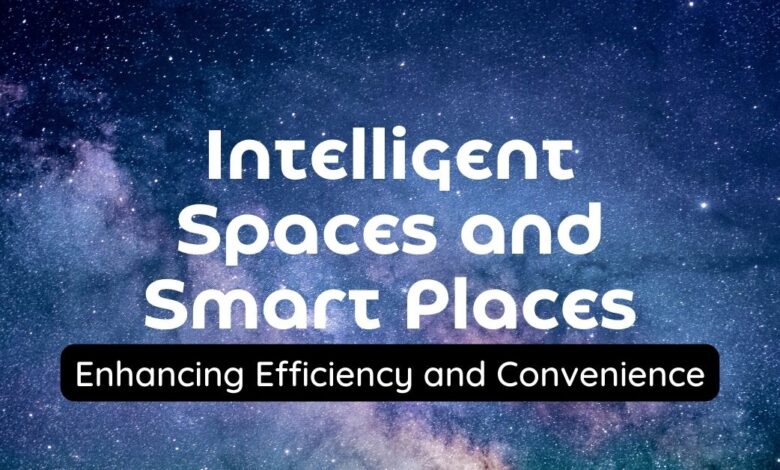Intelligent Spaces and Smart Places: Enhancing Efficiency and Convenience

In our changing world, technology is blending with physical spaces to create smart environments. These spaces aren’t just efficient but also smart, changing the way we live and work. Let’s dive into what intelligent spaces are, their advantages, and their impact on the future.
Table of Contents
What Are Intelligent Spaces?

Intelligent spaces are places where technology works well with people and things. They use data, connections, and automation to make things easier and safer. Here are some key points about them.
1. Connectivity
Everything in intelligent spaces is connected. Devices, sensors, and systems talk to each other, sharing information instantly.
2. Data-Driven Choices
Sensors collect data on various things like temperature and occupancy. This data helps make better decisions, like managing resources and making things better for users.
3. Automation and Control
Automation is important in intelligent spaces. Things like lights, heating, and security can work automatically based on rules or what users want.
4. Adaptive Environments
Intelligent spaces can change as needed. For instance, lights adjust to natural light, and meeting rooms change based on how many people are there.
Examples of Intelligent Spaces
Here are some places where you can find intelligent spaces.
- Smart Homes: Houses with smart systems for lighting, security, and more. Voice assistants like Alexa make controlling these systems easy.
- Connected Offices: Offices that use sensors to manage things like lights and heating. Meeting rooms adjust automatically, and workers can find free desks with apps.
- Smart Cities: Cities using data and devices to improve living. This includes things like smart parking and energy-saving street lights.
- Retail Stores: Shops using technology to improve shopping experiences. Beacons send offers to phones, and smart shelves keep track of stock.
Benefits of Intelligent Spaces

Intelligent spaces offer many advantages
- Efficiency: Automation saves energy and makes things run smoother, saving money and time for businesses.
- Safety and Security: These spaces use cameras and alerts to keep people safe, like managing traffic in cities.
- User Experience: Intelligent spaces focus on making users comfortable, with personalized features and easy navigation.
- By using less energy and reducing waste, these spaces help the environment.
Challenges and Considerations
However, there are some challenges to consider
- Privacy: Collecting data can raise privacy issues, so it’s important to find a balance between convenience and privacy.
- Interoperability: Different devices need to work well together, which means having common standards and protocols.
- Scalability: As more spaces become intelligent, it’s important for systems to grow and adapt easily.
Conclusion
Intelligent spaces are changing how we live and work. Embracing these smart environments will make life more efficient, connected, and sustainable. Whether you’re at home, work, or planning cities, understanding and using intelligent spaces will be crucial for a better future.
You Might Also Like To Read
Discover What’s New in iOS 17.4.1 and iPadOS 17.4.1: Bug Fixes and Security Enhancements.
FAQ’s
What exactly are intelligent spaces?
Intelligent spaces are physical environments where technology seamlessly interacts with people and objects. They leverage data, connectivity, and automation to enhance efficiency, safety, and convenience.
How do intelligent spaces benefit individuals and businesses?
Intelligent spaces offer numerous benefits. They improve efficiency by automating tasks, enhance safety through surveillance and alerts, prioritize user comfort, and contribute to environmental sustainability by monitoring energy usage and reducing waste.
What are some examples of intelligent spaces in everyday life?
Examples of intelligent spaces include smart homes with automated systems for lighting and security, connected offices with sensors managing lighting and heating, smart cities using data analytics for traffic management, and retail stores with personalized shopping experiences through beacon technology.
What challenges do intelligent spaces face?
Some challenges include privacy concerns related to data collection, the need for interoperability among different devices and systems, and ensuring scalability as more spaces become intelligent.




